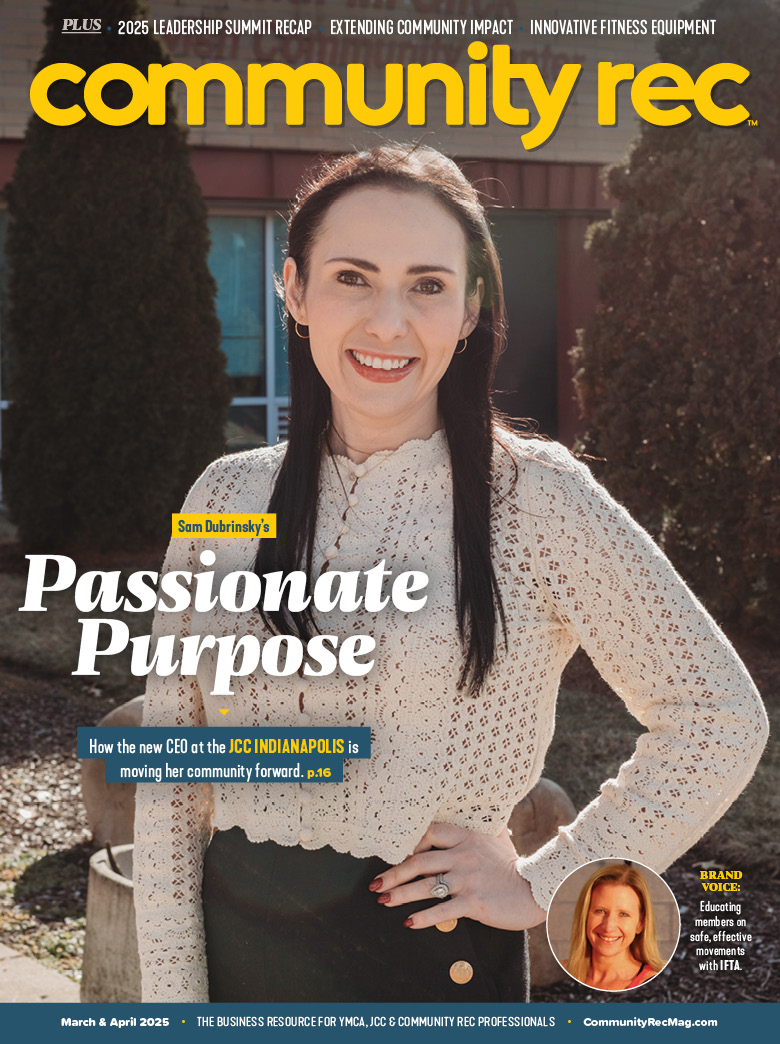Part One of “Fundraising in Nonprofit Organizations,” by Gary Bernstein, CEO of the Jewish Community Alliance of Northeastern Pennsylvania.
Whether you are fundraising for the construction of a new facility, renovating or adding on to an existing building structure, this body of work could be one of the most satisfying endeavors an executive may experience. It will provide an opportunity to meet with prospective supporters and current donors and tell them about all the wonderful ways your nonprofit is improving the condition of the community and the lives of the people it serves.
Staying close to your members and knowing their needs and interests will yield big rewards for your agency. At the end of the day, what counts most is the skill in being able to develop positive relationships with others while motivating prospects and volunteers.
The agency executive faces challenges and roadblocks each day. There are no easy victories or solutions, but with a high level of energy and a passion for solving problems, you along with your agency and your campaign, will be successful. Despite the economic challenges that have occurred in recent years, philanthropy in the United States represents hundreds of billions of dollars each year flowing from the private sector to nonprofit organizations. “Americans have contributed more than $461 billion to charity in 2020.” (Giving USA 2021)
There are millions of nonprofits who rely on charitable giving for survival. Today, nonprofit organizations face complex needs while concurrently addressing fundraising, investment management and overall governance issues. Very few undertakings offer as much challenge and satisfaction as a major gifts or capital campaign. Developing and implementing a campaign can be both exhilarating and nail-biting.
Professional and Personal Campaign Skills
The successful fundraiser knows the key to mastering their craft is understanding people, and a key to understanding people is to remember no two are entirely alike. The only reason philanthropy works, in fact, the only reason what we do is ever successful, is because people want to make a difference in the world, and they believe they can achieve that through a particular organization.
If your agency receives a substantial gift, it will not simply be because of need, and it will certainly not come because it was expected. It will happen because donors decided it was the best place to invest in people and you made it easy for them to see that.
Donors want to invest in projects they care about and in organizations which demonstrate what they do matters. Your goal should be to change people’s lives for the better, which is why we must make donors aware of why your agency exists and what it achieves. People will give to change lives for the better. The only reason philanthropy works is because we have a positive impact on changing other people’s lives.
Begin every fundraising endeavor with a reminder: this is our mission; this is what we do and this is how we are impacting people’s lives.
People of great wealth give money for this reason. We must be vigilant in asking ourselves, “Just how are we having an impact on changing people’s lives and how we can best express this to potential donors?” This process begins and ends with how your agency makes a difference and how the donor can be a part of that exciting possibility.
To be truly successful, an executive must build partnerships and collaborative efforts. As good as an executive thinks they are, they cannot do it alone. You will talk, but your troops will only hear a portion of your message. That’s human nature. That is why enthusiastically demonstrating your dedication and love for the agency and campaign will inspire and stimulate others to get on board and support your efforts.
At the end of every year, we tend to create the top ten lists for outstanding movies, songs and exciting moments in sports. To orchestrate an effective campaign, the executive director must demonstrate and exhibit several certain traits, skills and characteristics.
Here is a top ten list of the most important campaign talents and attributes needed for the chief executive.
- Have a high level of ethics and integrity. Demonstrating honest and ethical behavior in all situations goes a long way toward building donor relations and long-term commitments to your organization.
- Treat people with respect. Regardless of whether you are networking with community leaders, recognizing the work of volunteers, or visiting with a member of your YMCA or JCC, everyone appreciates being treated with respect.
- Have strong verbal and written communication skills. There is no question effective communication with staff and donors is an essential ingredient for success. According to the leadership of Wal-Mart, Ford Motor Company and Harley Davidson, among the top three skills of a leader is their ability to communicate effectively. You can be brilliant, but if you can’t get your ideas across to others, brilliance doesn’t matter.
- Have the ability to inspire and motivate others. One of the qualities of good leadership is that one guides, leads and inspires others to want to participate in the process of moving toward the shared vision. The executive leader requires skills that inspire others to have faith and work in a team effort to reach the agency’s campaign objective. Leaders do not isolate themselves from the staff and their supporters. They must be inspiring and motivating, able to establish rapport and make everyone feel they care about every member and donor in the campaign.
- Be a good listener. We do not spend enough time listening to our donors. Donor time is too precious to be squandered. Individualize cultivation and solicitation to the donor. Consider, develop and implement each solicitation based on your prospect’s desires and not necessarily your agency needs. What you hear will be greatly enhanced by what you ask.
- Be action oriented and a hard worker. It’s not good enough to have an organization that creates lots of innovative ideas if nothing ever gets done about them. An action-oriented agency executive is skilled in idea generation, is committed to achieving outcomes, and intentionally and consistently produces results based on those ideas. Not just any results, however, but meaningful and measurable results, based on the strategy, plans and initiatives of the agency.
- Be a great planner and well-organized. Do the necessary research to be sure of the appropriateness of the solicitation request. One who is equipped with thorough research and expertise around cultivation and solicitation exudes confidence and ability in style and presentation. Confidence is authentic and always in good taste.
- Possess a leadership quality. Executives with strong leadership skills are the ones who rise above the crowd. Trust is the basis for almost all relationships in life. Without trust, it’s almost impossible to create healthy and productive environments. Remember, people are always watching you, assessing your values and integrity. When your people trust you, they will be more apt to follow you and give you their best effort.
- Value the donor’s gift and understand the significance of saying thanks. Give thanks sincerely and freely. It is often said you need to thank a donor at least five times for a gift supporting your organization. A note of appreciation from your development director is important, but a note of thanks from one of the families served by your organization is even more effective. It is extremely important to your organization that proper and tasteful recognitions are given for their gift. It paves the way for gifts to follow.
- Have passion. To meet the financial demands of your agency and raise money at the level you desire, you must be passionate about fundraising. Passion has several great benefits. First, it helps bring things to life. Let’s bring the mission of the organization to its full potential. Let’s give it life. What we talk about, and first need to be passionate about, is the impact we make in the lives of our members. Then we need to make it clear we are in the position to use the donor’s money to effectively change people’s lives. Passion produces visibility, creativity and productivity. It will have a positive influence on those around you and it will make you a better fundraiser. Having passion about your agencies purpose is an exceptional edge.
Boards and Fundraising
JCCs and YMCAs should include board members with the diverse background, experience and organizational and financial skills needed to advance the organization’s mission. It is suggested a nonprofit include board members experienced in fundraising, budgeting and financial management, as well as in public relations, marketing and investments.
Although development professionals often view new fundraising initiatives primarily as an opportunity to engage additional constituents, fundraising campaigns also provide reason to encourage greater involvement of those closest to organizations, the board member first and foremost. Carefully fashioned, purposefully planned board solicitations can lead to substantial new philanthropy. It is interesting to note high net worth individuals not only make donations, but they also give their time and talent to support nonprofit organizations.
Some boards understand their role at fundraising, where others could use additional help. Yet there are still others that aren’t at all comfortable with fundraising or don’t consider it part of their job as board members. No matter how urgent the need or important the cause, a campaign is life-less until those closest to the organization lend its influence and affluence.
Board members must realize without their active participation in identification, cultivation and solicitation of peers that can advance the organization’s mission, a campaign is just potential energy. Active, motivated board members can transform potential into a strong campaign effort. Fundraising is not about asking their friends and peers for money, it’s more about telling a story.
For those board members who find it difficult to ask others for money, they can start out hosting tours to bring prospective friends closer to your organization. A carefully scripted tour can be a powerful way to demonstrate your organization’s good work and to illustrate unmet needs in the community. The tour lets your work speak for itself.
Your prospective donors and guests will hear staff members or even clients, members, and stakeholders express in their own words their personal firsthand experiences with your organization’s mission, and the good it does in the community. Board members should never sit on a board of a nonprofit organization unless they are willing to express their leadership by asking friends, family and acquaintances to make gifts of a size consistent with their ability to give. Board members must be eager solicitors of donors, especially those with the ability to make meaningful gifts.
In addition, the nonprofit’s board of directors should be good stewards. The activities associated with stewardship are focused on ensuring the funds provided by donors are utilized in the way intended in gift agreements and fund terms. Stewardship can be further defined as the careful and responsible management of something entrusted to one’s care of the agency’s fundraising resources.
Boards are charged with ensuring the agency’s funds are used to further charitable purposes and are appropriately accounted for. In the end, the success of any fundraising campaign hinges on leadership, and that leadership starts with the board. Simply stated, board members are the most essential campaign solicitors. They are the best fundraising resource an organization has.
References
- Giving USA. (2020) givingusa.org
- Hartsook, Bob. (2005) Reality Fundraising. ASR Philanthropic Publishing: Wichita, Kansas.
- Hartsook, Bob. (2001) Getting your ducks in a row: ASR Philanthropic Publishing: Wichita, Kansas.
- Moisan, Len. (2021) Phone Interview










